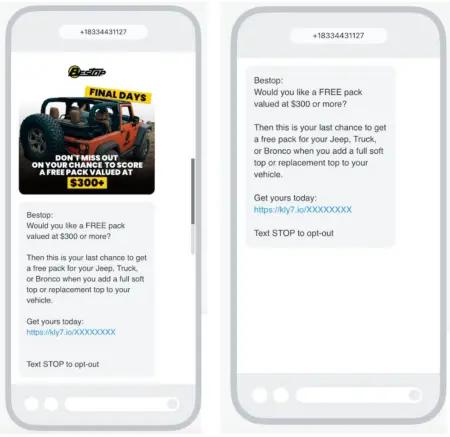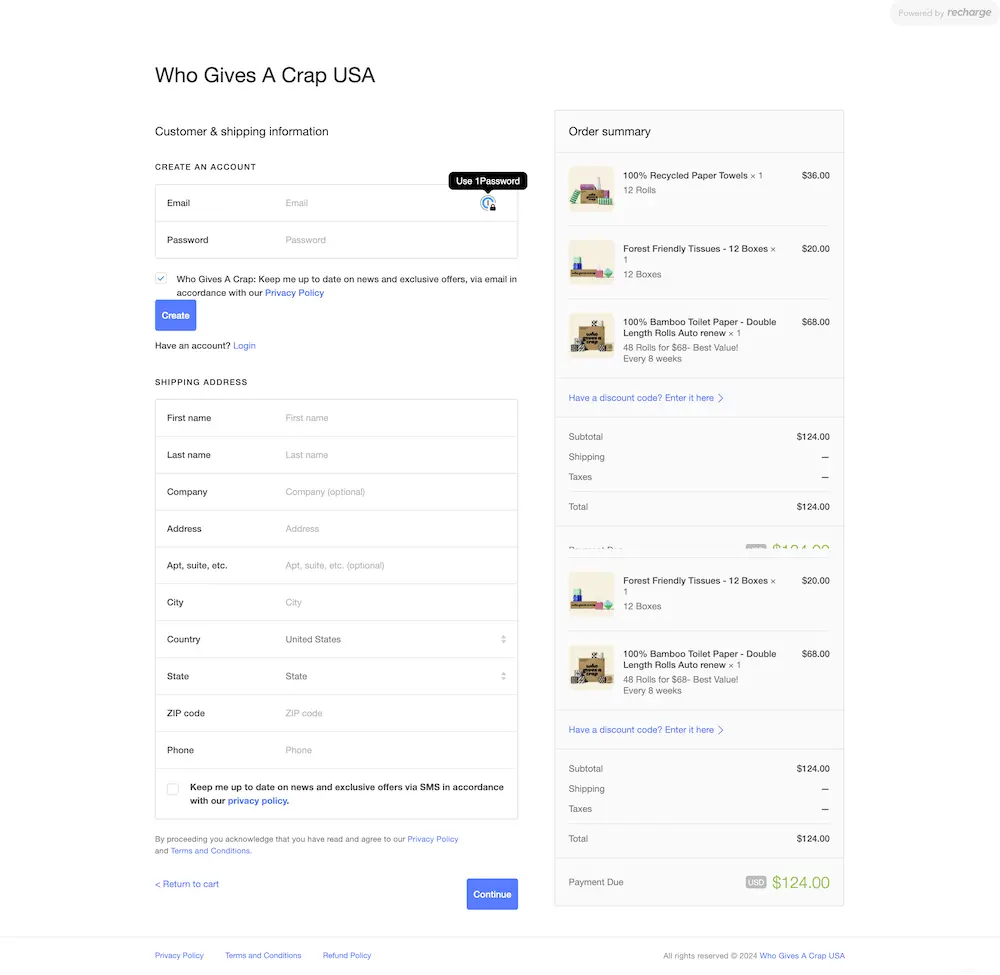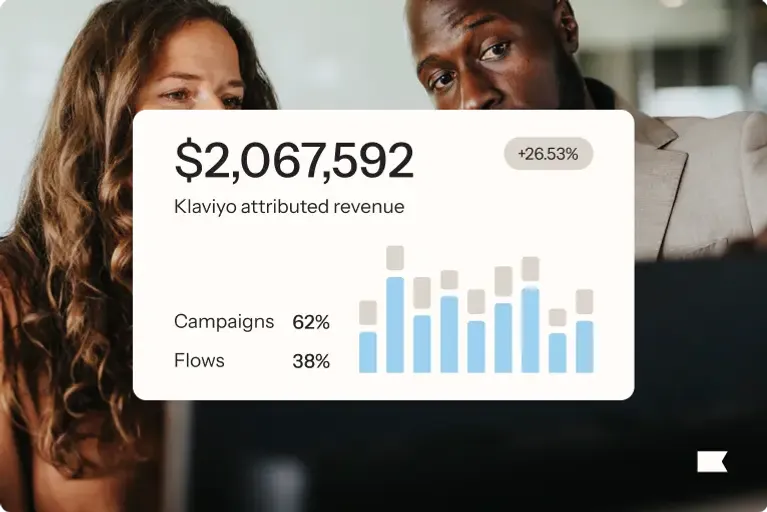There are so many components to an integrated marketing campaign that it can be hard to prioritize which metric to pay attention to.
You may have slick marketing emails with clever subject lines. Your social strategy may be so creative it goes viral. Your open and click rates might be through the roof.
But your placed order rate, which you can find in your marketing reporting and is measured as the number of people who place an order divided by total recipients, is the real truth teller: it gives you a clear picture of how effective your marketing strategies are and how smooth your user experience is.
There are a few reasons your placed order rate might be lower than you expect:
- Your deliverability is hurting, and your marketing emails aren’t arriving at all.
- You’re sending fewer emails than normal.
- Fewer people are opening your emails in the first place.
- Click rates are down due to weak calls to action (CTAs)—or too many CTAs.
- Your customer journey is haphazard or chaotic, with links leading to non-ecommerce pages of your site or a page that isn’t relevant to the content of the email.
- You recently changed your check-out experience.
If your placed order rate is low—especially compared to your other metrics—here’s your roadmap for getting that number up.
1. Fine-tune your segmentation
“Segmentation is key,” says Tim Akers, founder at Akers Digital. “Send messages to people most likely to open them so you can maintain a high sender reputation. Our clients rely heavily on segmentation to achieve over 60% open rates on campaign sends, which keeps us out of the spam and promotional folders.”
Segmentation is key. Send messages to people most likely to open them so you can maintain a high sender reputation.
All of that, in turn, can improve your placed order rate by helping you reach customers where they are in their journey with your brand—and get your messages in front of the audience that’s most interested in what you have to say.
Segmentation tips for improving placed order rate
Here are a handful of ways you can sharpen your segmentation on both marketing campaigns and automations in order to improve your placed order rate:
- Send primarily to engaged segments to keep your open and click rates up.
- Add conditions to your segments around customer interests, location, characteristics, and more to personalize your messaging.
- Consider creating the following segments if you haven’t already:
Cross-sell segmentLocation-based segmentItem- and brand-specific segmentEngagement-tier segmentChurn risk segmentAverage order value (AOV) segmentHoliday shoppers segment- Cross-sell segment
- Location-based segment
- Item- and brand-specific segment
- Engagement-tier segment
- Churn risk segment
- Average order value (AOV) segment
- Holiday shoppers segment
Pro tip: Layering in multiple segments to your campaigns will allow you to collect more data, which in turn helps you make better decisions about how to segment. For example, you can create a 30-day segment for buyers and another for prospects, allowing you to see the conversion rates for each one. This gives you the potential to move to sending a different campaign each week. Adding in 30, 60, and 90-day segments into one campaign can help you better understand when engagement is falling off.
Using segmentation to improve placed order rate: an example
A segment of low-customer-lifetime-value (CLV) customers may have spent less money with your brand than you’d like, but they still interact with your content.
That’s a ripe opportunity to drive more placed orders, as long as the content is personalized to their spending history.

Image source: Klaviyo
2. Use links wisely
The guiding principle for using links in marketing messages is that they should align with the content of a marketing message and aim to drive conversions.
That means the primary CTAs in an email or SMS message should link to an ecommerce page of your site.
Linking tips for improving placed order rate
While it’s okay to link elsewhere, try to minimize links that go to non-ecommerce pages of your site, like your homepage, blog, or contact page.
Here are a few other best practices for adding links to your marketing messages:
- Make sure they’re easy to find within the design of your email.
- Include a clear CTA.
- Make sure all links work and lead to the correct place.
- Don’t add too many links that will overwhelm subscribers.
- Make sure you follow accessibility guidelines.
Pro tip: One CTA reduces the cognitive load, making it easier for the subscriber to make a decision. If you give a subscriber too many options, they may just get overwhelmed—and not click on anything as a result.
Using smart linking to improve placed order rate: 2 examples
Plant-based energy drink brand Joggy follows these linking best practices perfectly in this marketing email.
With just one easily visible CTA button and the color of the text sharply contrasted against the background color, the brand’s linking strategy sets them up for placed order rate success.

Image source: Joggy
Your linking strategy is just as important in SMS marketing. Consider this simple, straightforward SMS from Dixxon Flannel Co., with an easy-to-spot CTA:

Image source: Dixxon Flannel Co
3. A/B test your messaging
A/B testing is one of the sharpest tools in your marketing toolbox. You can use it to understand the content, send times, and subject lines that your audience responds best to.
And you don’t have to just test one option vs. the other—in Klaviyo, you can create multiple variations (we recommend up to 4) of a campaign or flow email.
A/B testing tips for improving placed order rate
Here are a few best practices for A/B testing your messaging to improve your placed order rate:
- Start with a hypothesis, like “Our marketing emails do best with two CTAs—one above the fold and one below,” or “Using fewer images makes our marketing emails perform better than using more than 3-4.”
- Test just one variable at a time. Otherwise, you won’t be able to tell which shift caused the change in performance.
- A/B test with a large enough audience—your results will be more statistically significant this way.
Using A/B testing to improve placed order rate: an example
Bestop, an industry leading provider of soft-top Jeep accessories, A/B tested these SMS messages against each other—one with an image and one without.
The message without the image earned a click rate nearly 5% higher than the one with images. It was also successfully delivered to more subscribers and drove nearly double the revenue.

Image source: Bestop
4. Improve the on-site experience
Your placed order rate could drop from changes you make to your website, such as changes in your check-out experience.
Make sure your CTA for “add to cart” is well-positioned and easy to recognize.
Make sure your FAQs around returns and shipping are clear and easy to find.
Consider marketing higher-priced products to a segment of high-CLV customers. If that doesn’t work, determine whether the raised price is worth the drop in placed order rate.
If your shipping costs are causing fewer placed orders, consider offering free shipping for VIPs.
Revert back to the previous design or continue testing—a negative change in placed order rate is never worth it just for design’s sake.
Pro tip: A/B test various site layouts. You might also consider using Shopify’s one-page checkout feature to give shoppers a smoother check-out experience.
Improving the on-site experience to improve placed order rate: an example
Australian toilet paper brand Who Gives A Crap has a simple, user-friendly check-out page.

Image source: Who Gives A Crap
5. Optimize your automations
Automations, which Klaviyo calls flows, are an excellent way to increase your placed order rate without much day-to-day effort, since, once they’re set up, they automatically get sent to subscribers who qualify.
Automation optimization tips for improving placed order rate
For starters, make sure you set up the automations below. Klaviyo’s latest benchmarks report found that these generate engagement at every stage of the funnel, all the way to placing an order:
- Abandoned cart flows have the highest placed order rate for all flows: 3.33%.
- Welcome series have a high placed order rate overall: 2.32%.
- Browse abandonment flows consistently convert at a rate of 0.95%.
- Post-purchase flows have an overall placed order rate of 0.54%.
- Abandoned check-out, an often overlooked automation, is also worth setting up and testing.
But you don’t have to stop with those.
“Don’t underestimate the impact of email flows,” says Aryana Adkanian, marketing automation strategist at 829 Studios. “In addition to those tried-and-true ones, try out new flows like site abandonment, expected date of next order, and price drop to generate additional revenue and improve conversion rates.”
Don’t underestimate the impact of email flows. In addition to those tried-and-true ones, try out new flows like site abandonment, expected date of next order, and price drop to generate additional revenue and improve conversion rates.
Pro tip: Post-purchase flows are a great way to increase orders. Klaviyo AI even enables you to include blocks in your post-purchase emails suggesting other items the shopper might like.
Placed order rate FAQs
Why is my placed order rate low?
There are several reasons your placed order rate could be low, including deliverability problems, a customer experience that isn’t intuitive, recent changes in the check-out process, or sending fewer emails than normal.
How can I improve my placed order rate?
5 ways to improve your placed order rate include:
- Adjusting your segmentation
- Using links wisely
- A/B testing your messaging
- Improving the on-site experience
- Optimizing automations
Which automations have the best placed order rates?
According to Klaviyo benchmarks data, abandoned cart flows have the highest placed order rate for all flows (3.33%), followed by welcome series (2.32%), browse abandonment flows (0.95%), and post-purchase flows (0.54%).
Power smarter digital relationships with Klaviyo SMS.
Get started



